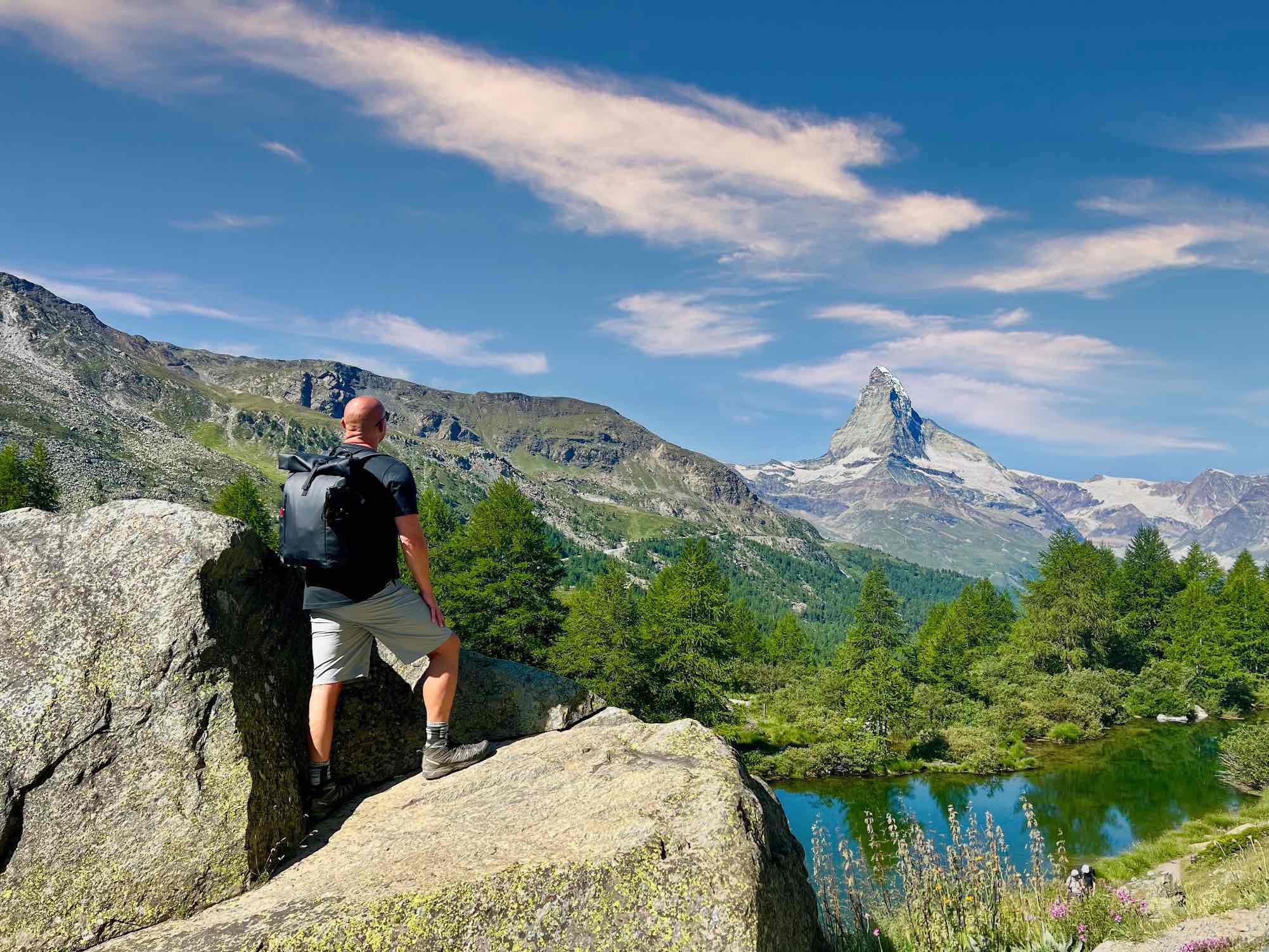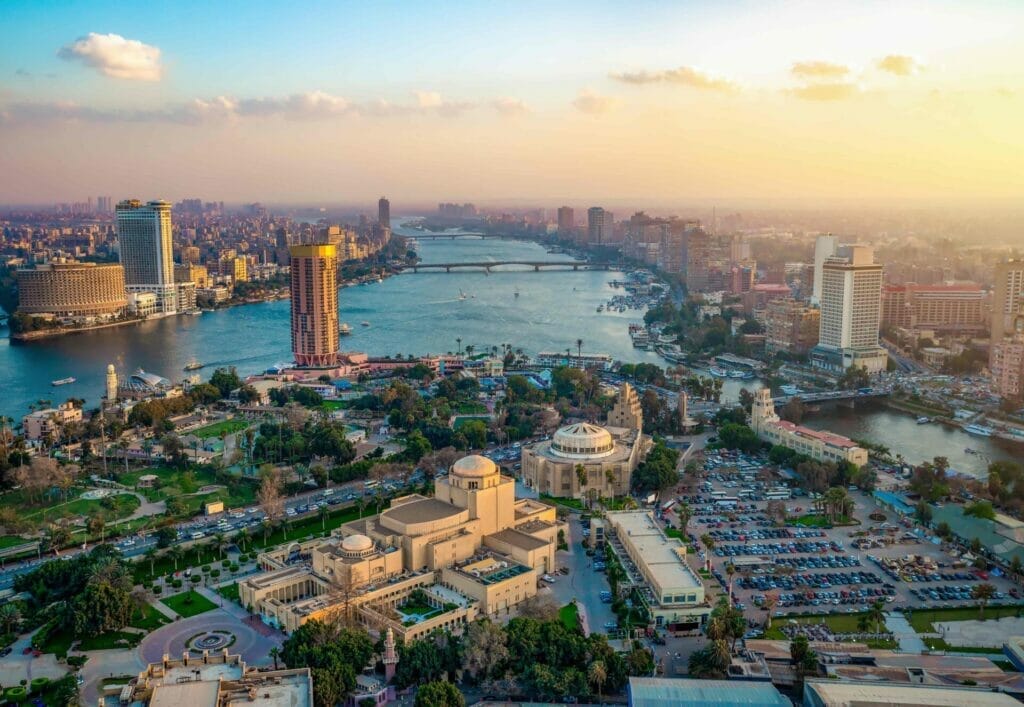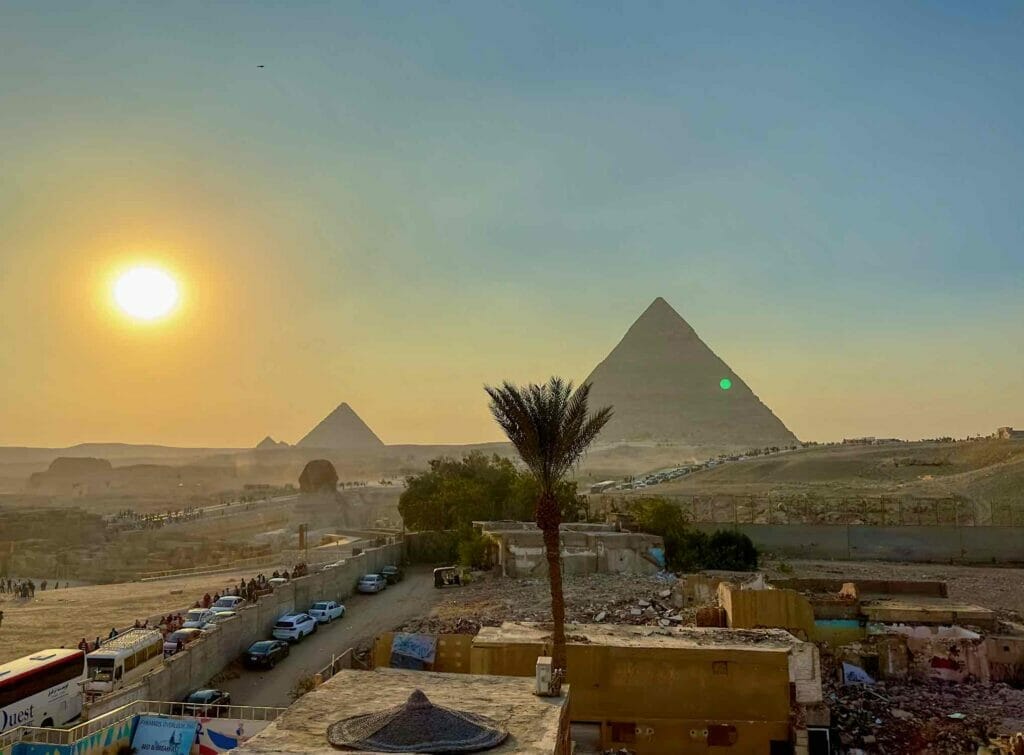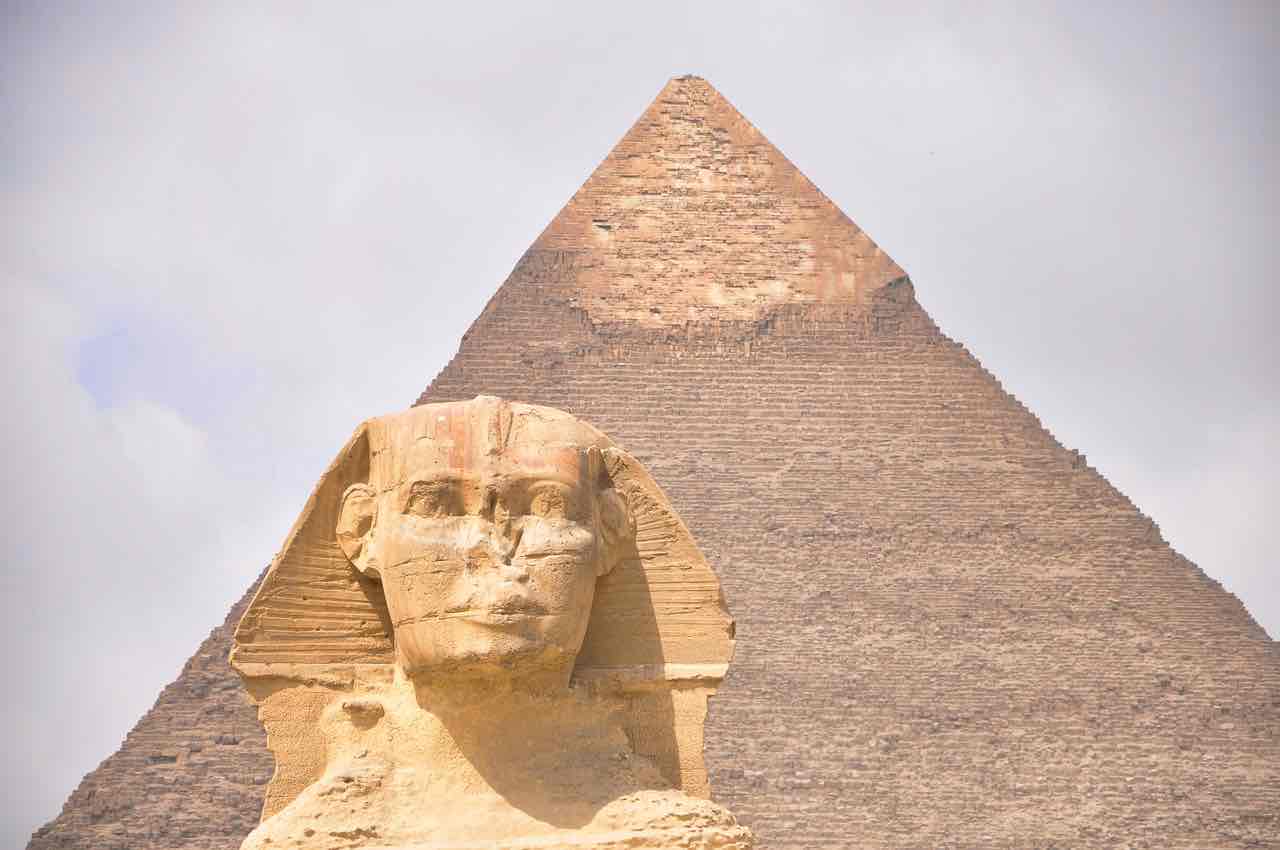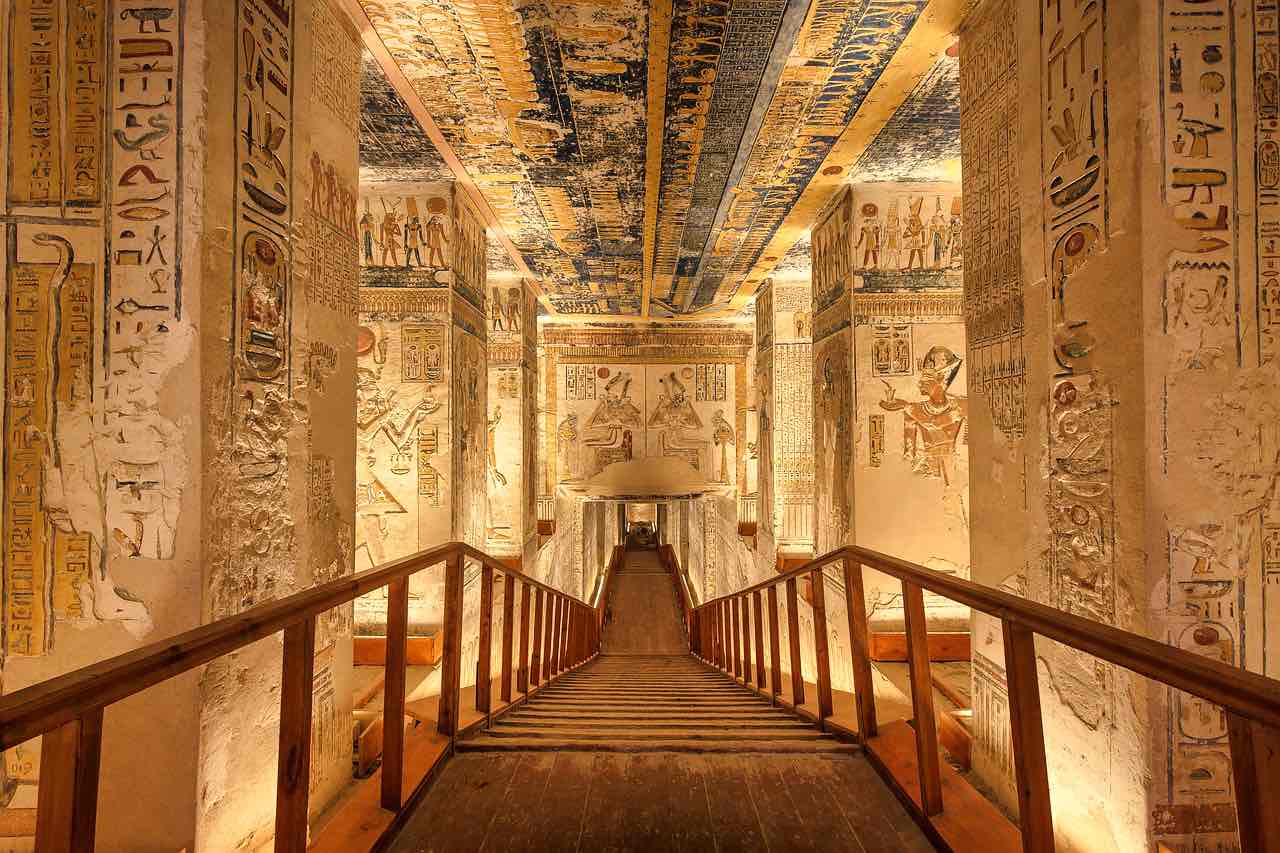Table of Contents
ToggleBrief Overview
The Ultimate Egypt Travel Guide! Egypt is a goldmine of history and culture, as it is the birthplace of one of the world’s earliest and most influential civilizations. The Pyramids of Giza and the Temples of Abu Simbel are just a couple of the many famous historic sites that can be found across the country, from Cairo to the Nile Delta. In addition, the beautiful coral reefs of the Red Sea can be explored while lounging on Egypt’s coast. This guide will help you make the most of your time in Egypt, no matter where your travels take you, by providing you with the information you need to make informed decisions about when to go, where to stay, and what to avoid to keep yourself safe.
Language: Modern Standard Arabic is the official language of Egypt1, although Egyptian Arabic is the lingua franca.
Currency: The Egyptian pound (EGP).
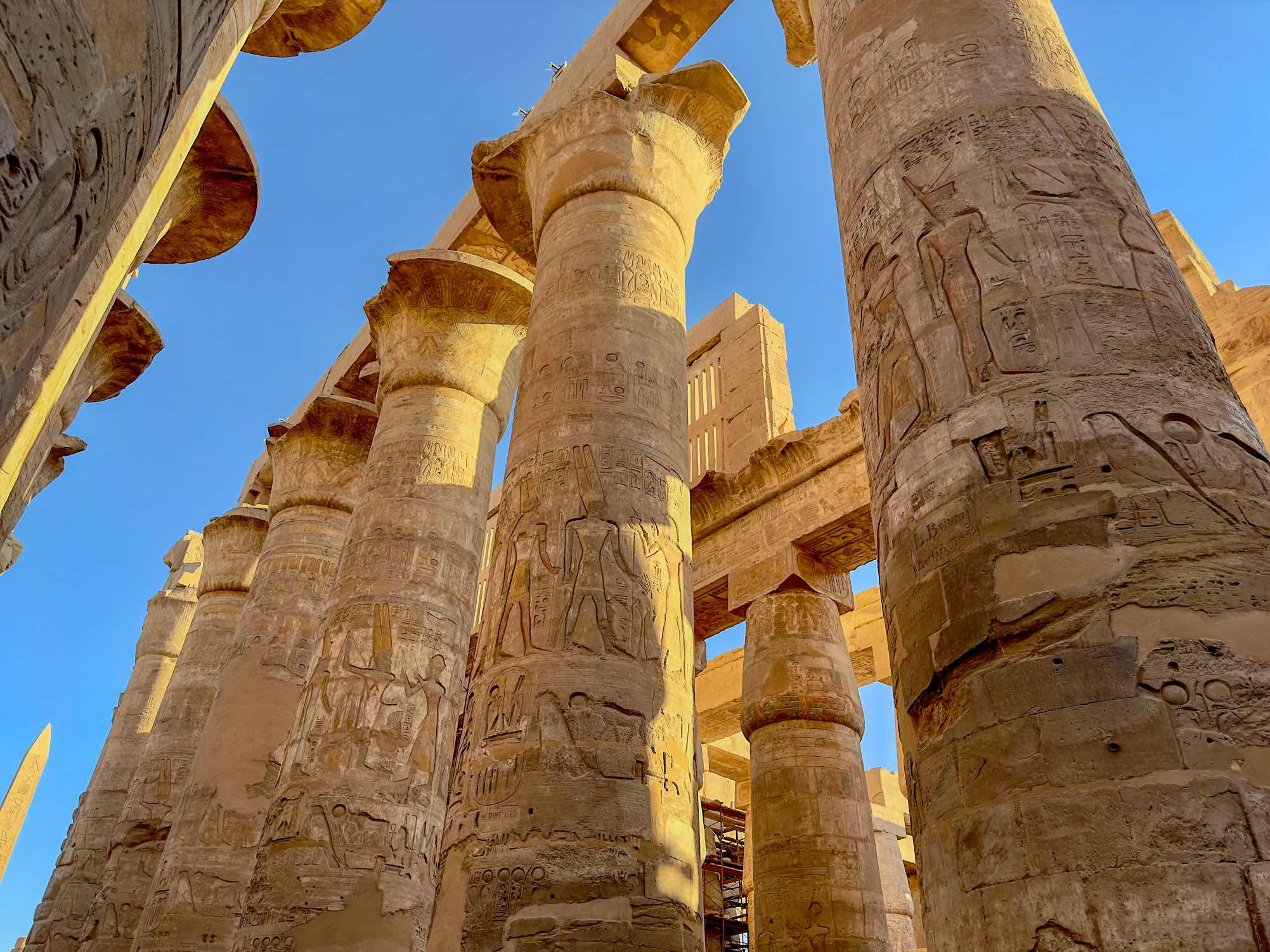
Best time to visit
The weather in Egypt is ideal from October to April, when the temperatures are milder than they are in the sweltering Egyptian summer. During the winter holiday season (December – January), tourism services and lodging will be more expensive and more crowded than usual.
We went in January when temperatures were around 20 degrees and there wasn’t a cloud in the sky! Magical!
Getting around Egypt
A ride with Uber is the simplest and safest way to navigate around large cities like Cairo and Alexandria. EgyptAir is the primary supplier for domestic flights, while taxis, microbuses, and standard buses service short and long-distance travel everywhere in the country.
If you wish to get from Cairo to Luxor / Aswan your best mode of transport is a Sleeper Train!
Things to see and do
Visit the Pyramids of Giza and the Sphinx
When travelling to Egypt you’re obviously here to see the Pyramids and the Sphinx: The Pyramids of Giza are among the world’s most well-known structures and one of the Seven Wonders of the Ancient World. The Sphinx is a statue depicting a legendary animal with human features. Both are easily accessible from Cairo’s suburbs and provide fascinating insights into ancient Egyptian art and construction.
Book a half-day tour with our partner here
Explore the Valley of the Kings and Valley of the Queens
Discover the tombs of New Kingdom Pharaohs at the Valley of the Kings, one of Luxor’s most famous archaeological sites. Nearby, the Valley of the Queens is also impressive. Egypt’s royal kings and queens are buried in both valley of the kings and the Valley of the Queens. These tombs feature exquisite wall murals and carvings that shed light on ancient Egyptian religion and culture.
Also be sure to check out the Temple of Hatshepsut in Luxor, which serves as a tomb for the Pharaoh’s namesake. Its position on the western bank of the Nile River and its elaborate columns and carvings have made it famous. This is next to the valley of the kings.
There is an extra charge for tombs like Tutankhamun.
Book your tour here
Visit the temple of Karnak
The Karnak Temple in Luxor is an enormous religious complex well worth exploring. It was the ancient Egyptians’ place of worship and is one of the greatest temple complexes ever built. The temple is made up of many rooms separated by columns and obelisks; its walls are decorated with elaborate sculptures and hieroglyphs.
Take a Nile River cruise
The Nile River is the lifeblood of Egypt, and a trip along the Nile is a fantastic way to explore the country’s many historical landmarks. Cities like Luxor, Aswan, and Abu Simbel, as well as its associated temples and tombs, are among the attractions along the river.
You can book the same 4 night All Inclusive Nile Cruise as we did here
Visit the Abu Simbel temples
Abu Simbel is home to two enormous temples carved onto a cliff face and is well worth a visit if you find yourself in southern Egypt. Instead of having them flooded by the Aswan High Dam, they were moved to a safer site. The temples are well-known for the enormous statues that adorn them and for revealing the splendour of ancient Egyptian design and construction. They really are a sight! Go super early to avoid the crowds!
Book your tour of Abu Simbel here
Visit the Egyptian Museum in Cairo
A must when in Cairo because you get to see the world’s largest collection of ancient Egyptian artefacts at Cairo’s Egyptian Museum. Ancient Egyptian mummies, jewellery, ceramics, and sculptures span the museum’s collection, which spans all dynasties of Egypt’s history. You will also see Tutankhamun’s famous head dress.
You can book tickets direct here
Take a guided tour of Islamic Cairo
Visit the old mosques, madrasas, and other Islamic landmarks in Islamic Cairo on a guided tour. Islamic Cairo is the city’s historic core. The sights of the city and the opportunity to hear fascinating tales of Islamic Egypt’s past are just two of the benefits of taking a guided tour.
Book our recommend tour here
Try traditional Egyptian street food
Try some authentic Egyptian street food! Egyptian street food is a huge component of the country’s culinary heritage. Dishes like falafel, kushari, and fattah, which use a wide range of flavours and ingredients, can be found at restaurants and food stands. Cheap and delicious, street food is the best way to sample authentic Egyptian cuisine on a budget.
Explore the Red Sea
Come scuba dive or snorkel the Red Sea, a destination renowned around the globe. Coral reefs, fish, and other marine life make up the area’s thriving ecosystem. The Straits of Tiran and Ras Mohammed National Park are just two of many excellent diving locations along the Red Sea coast.
Money Saving Tips
As a result of the favourable exchange rate, tourists from countries with strong currencies (such as the U.S. dollar or the British pound) will find that living in Egypt is quite inexpensive. In Cairo, you can stay in a five-star hotel and dine at a gourmet restaurant for a fraction of the price you would pay in New York or London. However, if you’re already travelling on a tight budget, consider these suggestions:
Wherever planning a trip, try to avoid the busy holiday season (December through January) when possible. Summer is the least expensive period to visit the interior of the country, provided you can handle the heat.
Don’t be afraid to bargain for anything, from cab fares to trinkets in the souk. Making an offer of 50% of the asking price is a smart place to start bargaining.Even while fine dining in Egypt is quite cheap when compared to other countries, you can obtain authentic Egyptian food at far lower prices at roadside stands and small restaurants. The more customers a stall has, the more probable it is to sell fresh, high-quality ingredients.
Where to stay
Pick your Egyptian vacation hub based on the attractions and activities you’re most interested in experiencing. Anyone on a quick trip can see and do anything they want in Cairo. Egypt offers both a glimpse into its ancient past at Giza and Saqqara, and a taste of its vibrant present at Cairo and Alexandria.
Booking a Nile cruise is a convenient way to visit the rest of Egypt’s world-famous temples and ruins. The most common route for cruise ships is between Luxor and Aswan. Make Aswan your home base or embark on a Lake Nasser cruise to get the most out of your trip to Egypt and see sights like Abu Simbel and the Aswan High Dam. Instead, visit the shores of the Red Sea for a totally unique experience.
Sharm El-Sheikh (on the Sinai Peninsula), Hurghada, and Marsa Alam are all well-liked vacation destinations.
What to Eat & Drink
The Nile Delta is an important agricultural region in Egypt, and its produce is vital to Egyptian cuisine. Because of the high cost of cattle farming in a location where water is a scarce resource, many recipes are historically vegetarian. However, beef and lamb are increasingly reasonably prevalent. In Islam, pork is taboo and is therefore never used in cooking. Some of Egypt’s most famous foods include ful medames (stewed fava beans), koshary (a mixture of rice, spaghetti, chickpeas, and lentils topped with tomato salsa and fried onions), and hawawshi (ground beef or lamb cooked inside a pocket of aish baladi bread). Travellers to Cairo won’t be short of options when it comes to food, with everything from Indian and Italian to Lebanese and Chinese available.
While some of Egypt’s five-star hotels and Western-style pubs and restaurants serve alcohol, traditional Egyptian eateries do not. There are, fortunately, many other delectable options to satisfy your thirst. Mango, strawberry, sugarcane juice (asab), and tamarind juice are just few of the many fruit juices available (tamrhindi). Though red hibiscus tea (karkade) is a popular choice in Egypt, served either hot or cold, our favourite hot drink is sahlab, a thick concoction of crushed orchid tubers, nutmeg, cinnamon, and shredded coconut. Mint tea and Turkish-style coffee are available year-round, whereas qamar al-din, or stewed apricot juice, and sobia, or coconut milkshake, are associated with Ramadan.
Getting to Egypt
The Cairo International Airport (CAI) serves as the primary entrance point for international travellers to Egypt and is a major hub for air travel across the continent. EgyptAir, the national airline, operates a nonstop service between New York’s John F. Kennedy Airport and Cairo. British Airways, Emirates, Lufthansa, and Air France are just a few of the hundreds of international airlines that service Cairo.
Domestically, EgyptAir flies to all the major Egyptian tourism hotspots, from Alexandria to Aswan. Egypt requires visas from most visitors, but visitors from some countries (including the US, Canada, the UK, and much of Europe) may be able to enter the country without one upon arrival.
Don’t forget to purchase your E-VISA to save time upon arrival!
Culture and Customs
The vast majority of Egyptians are Muslims, so travellers from non-Muslim regions should use caution to avoid offending locals. Dress modestly unless you are visiting a private beach resort. All tourists should do this out of common courtesy, but women who desire to avoid harassment should pay special attention. Whether you’re entering a mosque or someone’s home, you should always take off your shoes before entering. Affectionate displays are also frowned upon in Egyptian society. Lesbian, gay, bisexual, and transgender (LGBTQ) tourists, in particular, should avoid flaunting their identities in public.
Egypt has long used squat toilets, and this style remains popular today. In other words, you wash yourself with water and your left hand instead of using toilet paper. Consequently, you should never use your left hand for things like handshakes or eating, as it is considered unclean.
Prices for everything from taxi rides to street food to guides and even city tours are typically up for haggling in the country’s many bazaars and souks. The best thing to do if you can’t come to terms on price is to just say no and go. Tipping is expected in all service industries in Egypt, from the restaurant to the porter who helps you with your bags to the tomb guard who opens the door for you.
In recent years, Egypt’s reputation for security has suffered as a result of the country’s political unrest and rising terrorism. Operation Sinai, a military attempt to combat terrorism in the Sinai peninsula, has been largely effective, and the government is now more stable. The Western Desert and the Sinai Peninsula are currently in the path of severe danger, according to travel advisories (with the exception of Sharm El-Sheikh). Travelers to the Red Sea coast should feel secure visiting major attractions, but should be wary of pickpockets and other criminals. Never venture out alone at night in a city, and always wear a money belt to conceal your cash and valuables.
Book tours and Purchase Tickets
More Photos
Save this post (pin it)
Other Egypt Related Guides
Be sure to check out our other exciting guides related to Egypt:
We loved Egypt! Make sure it’s on your list.
Note: This post contains affiliate links. When you make a purchase using one of these affiliate links, we get paid a small commission at no extra cost to you.
